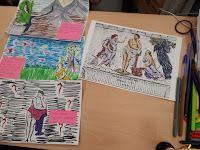As well as the fortune
teller I talked about yesterday, there were some thoughtful explorations created by the students, of what
it means to choose as – and with – Hercules, including those pictured in this posting.
Comments from the students on what they took from the session included:
“How fun it can be
incorporating myth and ways it can help children with autism – I really enjoyed making our Herculean nativity scene"
I did the session as a
one-off: as an example of how the module topic, classical myth. I'm now wondering whether it can have a
role in encouraging students to think from new angles about classical myth and the
ancient and postclassical meanings and applications of myth. When I hadn’t
long started this blog, I contemplated - in this posting - designing a module with autistic students
in mind: and indeed with all students in mind, as good disability practice is
good practice per se. This was in March 2009, so over a decade ago. I’m considering
doing something comparable now for my myth class in future iterations.
 I have just been invited to
speak about my autism work in a history pedagogy conference in Liverpool later
this year. In light of the public engagement focus of my autism work, I had initially
wondered whether my project would be relevant for a conference sharing practice
in learning and teaching in higher education. I’m now starting to think that it
could be relevant after all. The fit with the other papers at the CAMWS Conference
panel I’ll be participating in later this week (watch this space) – which are all concerned with university
classical pedagogy – is likewise perhaps strong than I’d realised. As mentioned previously I’ll put up the text of
that talk later in the week.
I have just been invited to
speak about my autism work in a history pedagogy conference in Liverpool later
this year. In light of the public engagement focus of my autism work, I had initially
wondered whether my project would be relevant for a conference sharing practice
in learning and teaching in higher education. I’m now starting to think that it
could be relevant after all. The fit with the other papers at the CAMWS Conference
panel I’ll be participating in later this week (watch this space) – which are all concerned with university
classical pedagogy – is likewise perhaps strong than I’d realised. As mentioned previously I’ll put up the text of
that talk later in the week.
Till tomorrow!




No comments:
Post a Comment